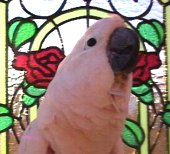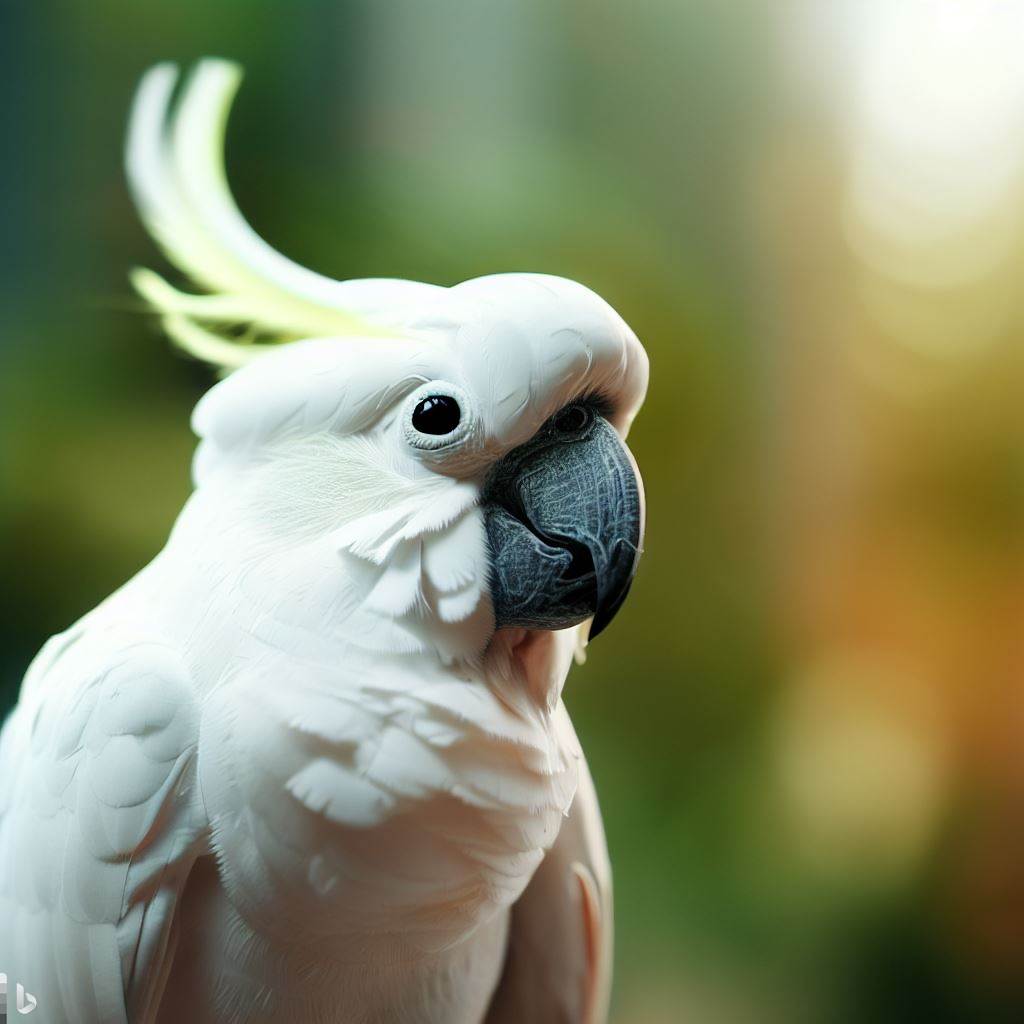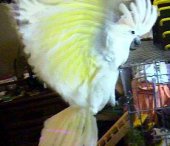Are Cockatoos really the most trouble of all the parrots, such as macaws and greys? Let’s celebrate and explore their uniqueness. Observation and study tell us Cockatoos are different in some ways from other parrots. And in some ways Cockatoos are even different from each other.My Jenday Conure taught me a lot about himself and parrots, so I confidently brought home my Moluccan Cockatoo. He was so different from my Conure. Had I been expecting these differences at the outset, I think our first six months would have been even smoother.
Some Cockatoo differences are subtler than my writing makes them appear. I exaggerate the tendencies to help make you aware of them. Some Cockatoos are not destructive and other Cockatoos are obedient, contrary to the tendencies identified here.
In general, the following is list of “could happen basic differences” between Cockatoos and other parrots.
- Cockatoos are the only parrots with crests. Crests are used to help them express their thoughts and communicate with their flock and with us as extended flock members.
- Although birds such as flamingoes are pink (their color comes primarily from eating shrimp) and egrets are white, the Cockatoo is the only naturally white or naturally pink parrot.
- A healthy Cockatoo’s skin has powder, a white talcum powder that is said to be primarily calcium so it sticks to clothes and carpet. The dust sometimes irritates allergy prone folks.
- A Cockatoo bite is said to be worse than any other parrot’s as their lower beak has 2 points, resulting in a 3-point bite if delivered.
- Cockatoos scream very loudly. Be sure all members of your family are willing to tolerate the twice a day scream of the Cockatoo. They are not considered good apartment birds as their calls carry a long distance and are piercing to the ears of neighbors in nearby apartments

- A Cockatoo loves to laugh and sing and dance – with you is preferable. Without you will do, too. Their joyful demonstrations are loud and can cost them their homes. Attached is a picture of my Umbrella cockatoo dancing and singing. Her joy is evidenced about twice daily in my home.
- Cockatoos are not obedient. “No” to a Cockatoo means “try again later.”
- Cockatoos are manipulative. They love to contemplate the best way to get you to let them do what they want to do.
- Cockatoos can be unpredictable in temperament. They can be contemplative one minute and screaming in fun the next. Their moods can change rapidly.
- Cockatoos are thought destructive because they are prolific chewers. Cockatoos may be more destructive chewers than many other parrots. They constantly need new supplies of wood to shred and gnaw. Never let them run out of chewing wood or Cockatoos will seek their own sources, such as your favorite china cabinet.
- Cockatoos are not usually the best talkers of the parrot family. Many speak very few words or don’t enunciate clearly when they do talk. However, they are thought to be the best parrot for learning tricks. In parrot shows, you will often see a cockatoo performing tricks. It seems to come naturally to them.
- Cockatoos are more mechanical than many other parrots and will disassemble their toys, your remote control and even their cages. They can escape almost any lock and explore the house reeking destruction
- Cockatoos should never be mishandled as these birds may remember forever.
- Cockatoos get their feelings hurt and pout or get aggressive.
- Cockatoos require much personal attention. They demand it, when they do not receive their cuddles and skritching.
- Cockatoos are very physically active. They romp, stomp, swing and flap to a great degree in play. Separate play stands are thought highly desirable by human(s) for working off cockatoo aggression and chewing tendencies.
- Cockatoos get carried away or overexcited in rough play and I play very gently with my Male Moluccan. Their playstyle is gentler than South American birds, being less beaky and less physical.
- Cockatoos are more curious and adventurous than some other parrots. Cockatoos will leave their playstand and take a tour of your entire house seeking adventure. When you set another species of parrot on the floor, that species may feel vulnerable and become intimidated, not a Cockatoo. Cockatoos are delighted to be down there on the floor. It is an opportunity to begin exploration activities.
- Cockatoos bore easily and keeping them challenged requires a lot of your time, both planning time and interactive time.
- Cockatoos will never, ever be molded to your will. Some birds can be more obedient and willing to please.
- Cockatoos can be dependent on their human(s). They do not come to you usually with much independence and they must be taught self-confidence.
- Cockatoos are thought to not be as adaptable to new homes and persons. Macaws are believed to be easier to relocate, train and keep happy.
- After infancy, Cockatoos can demonstrate aggressive behavior more quickly than other birds, not giving warning like the South American birds do.
- Cockatoos so love their human(s) that they will work for love rewards. Not many rewards are needed for their basic training. Because of this, it is essential that Cockatoos be greeted or cuddled immediately when you return home, even if you are away only for a few minutes at the store. The bond of the Cockatoo to its human(s) is very strong.
In a Cockatoo household, you may find that the human(s) know of these differences, make allowances for and accept them, and even make some adjustments in their homes for their Cockatoo’s differences.
Please, don’t think your new Cockatoo will come without some or all of the tendencies discussed. Some Cockatoos are more challenging than others. Some can be angelic one minute and of unreliable temperament the next.

If you can understand the uniqueness of your loving, intelligent, caring Cockatoo, then you will be repaid with a fulfilling, lifetime relationship with what many call the most cuddly, people-oriented of all the parrots.
To describe for you what someone once told me, a Cockatoo’s human strives for the patience of a saint, the creativity of Monet and the brilliance of Einstein to raise a Cockatoo. It is wise to never leave a Cockatoo unattended. You also should be prepared to become a very playful person and you need to enjoy a challenge. It is best if you are the kind of person who can respect that a creature this beautiful and sentient deserves to have your time and make the commitment that you will do whatever it takes to get the bird adjusted to your home. The Cockatoo is an intelligent, empathetic parrot that can make a bonded and treasured companion. Keep a Cockatoo’s brain and beak busy for a lifetime of feathered love.


